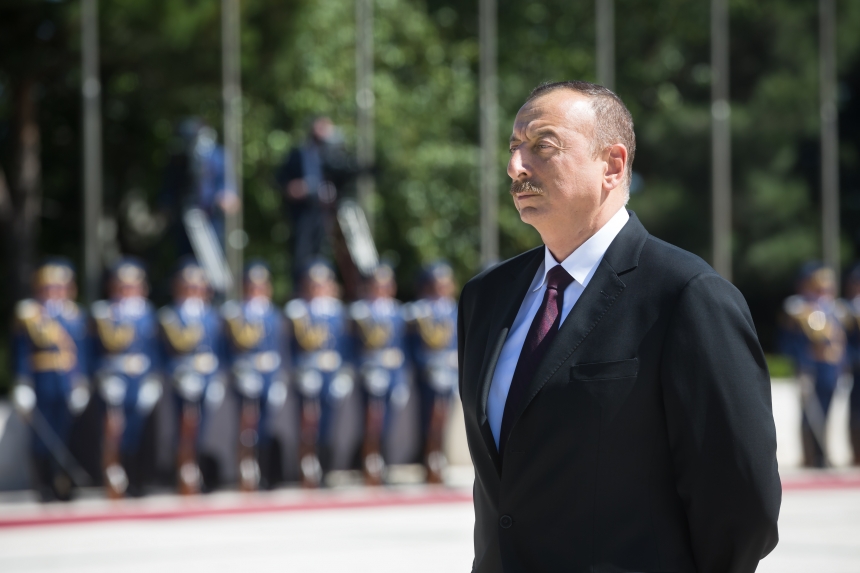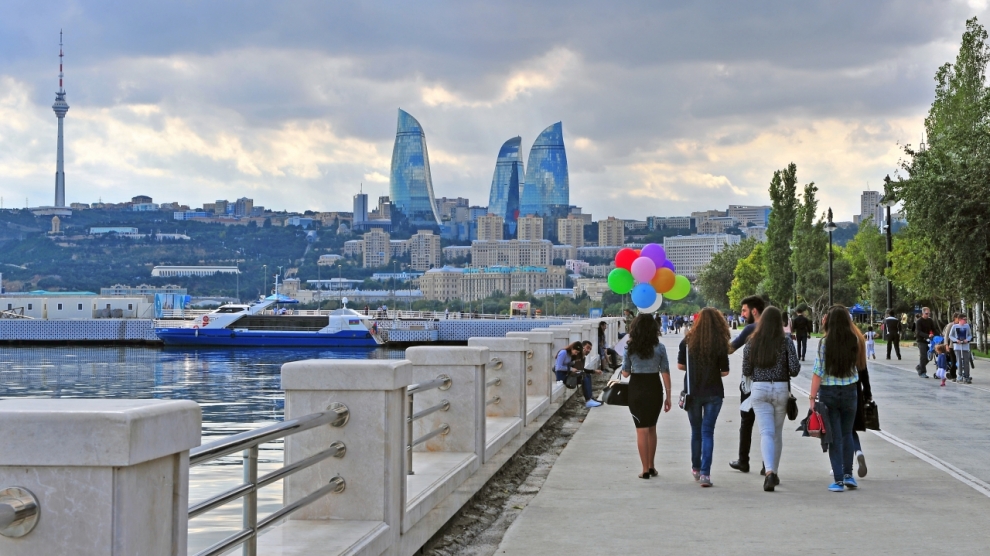Azerbaijan is a small but energy-rich country in a strategically sensitive location. Its leaders have had many choices about pathways to the future and through consistent decisions over two decades, have created a repressive oligarchic regime that is ruled by one family. How did Azerbaijan, which started on the path to political pluralism in 1992, become a corrupt state that abuses human rights and the media?
Azerbaijan’s hydrocarbon wealth is well-known, and the extraction and marketing of oil and gas from the landlocked Caspian Sea were among the new state’s key challenges. From early production-sharing agreements, in the 1990s, to pipeline construction, in the 2000s, Azerbaijan’s ruling elite has succeeding in closing lucrative international deals. That’s one factor.
The role of oil
As the only country that borders both Russia and Iran, it is well positioned to act as a transit hub for both the east-west and north-south trade and thus to facilitate or impede the movement of goods and travellers, as well as weapons, drugs, human traffic, and terrorists. These traits alone show that Azerbaijan is perpetually at a crossroads from where its leaders can decide how to use its resources and political potential.
The deeper one looks into Azerbaijan’s politics, society, and culture, the more crossroads—choices about pathways to the future—one finds. Most visible is the impact of Azerbaijan’s energy sector on society, for the ruling elites would not have the ability to exert power and so freely quash its critics without this wealth. The completion of the Baku-Tbilisi-Ceyhan main export pipeline, in 2006, coincided with a steady increase in global oil prices. Money flooded into Azerbaijan’s coffers.
On the one hand, the oil income greatly reduced the poverty of the immediate post-Soviet years and on the other hand, the opaque handling of that income, thanks to a series of government decisions on the structuring of both the State Oil Company (SOCAR) and the State Oil Fund (SOFAZ), directed the wealth into relatively few pockets. The secret money flow created a stratum of fabulously rich oligarchs including the ruling Aliyev family and the ministers of state.
The governing elite
The billionaires at the top of government came to control, often through family-owned businesses, construction, transportation, communications, banking, hotels and even food production and marketing. There are few opportunities for the majority of the population, apart from the oligarchs, in and out of government. Thus no Western-style middle class can emerge from this power structure whether it is professional jobs in government or in major businesses.
Protecting this oligarchic structure and the power and privilege of the elite families requires, of course, control of political process and the media. The restrictions against both spheres occurred in incremental steps and continue to the present day. Azerbaijan embarked on a path of political pluralism, shortly after the collapse of the Soviet Union, and affirmed its declaration of independence in October 1991.
The anti-communist Popular Front came to power in relatively free and fair elections in June 1992. Just one year later, in the face of battlefield losses in a war with neighbouring Armenia over the break-away region of Mountainous Karabagh, the Popular Front was forced out of power and the former communist leader, Heydar Aliyev, returned to Baku and became president by the autumn. He struggled to establish stability by bringing his communist-era supporters into government and reasserting the old standard operating procedures. He quickly managed major international agreements to exploit Caspian oil and eventually a cease-fire that still prevails.

“Democratic” approach
Soon after that, Aliyev’s intolerance for criticism and debate reasserted itself. The activities of opposition parties and their media organs were circumscribed but allowed to function as Aliyev claimed to be building democracy.
With the accession to power of his son Ilham in 2003, little changed. The younger Aliyev, with his retinue of his father’s ministers and advisers, disappointed hopes that he might be more tolerant than his father or even liberal. Rather, he has less political savvy and talks more about “democracy” while presiding over an increasing repression of opposition parties and media. With far more money flowing into Azerbaijan, after completion of the BTC, the elites had a free hand. The value of Azerbaijan’s oil, natural gas reserves, and strategic location led Western governments to focus on energy and security issues rather than democracy and human rights. Thus all parties made decisions that contributed to the degeneration of human rights and democracy-building in Azerbaijan.
The government of Azerbaijan did not rely solely on Western concerns about oil and transit rights. In the Council of Europe the Azerbaijani delegation actively worked to lobby, cajole, and even bribe PACE delegates, according to the detailed 2012 report, Caviar Diplomacy, by the Berlin-based European Stability Initiative. ESI documents the exchange of caviar and gifts for PACE support. A similar scandal broke in the US during 2014-15 with regard to members of congress and other US politicians (Hannah Hess’s Ethnics Offices Releases Report Detailing Lawmaker Travel to Azerbaijan, Roll Call, October 7, 2015 and Larry Luxner’s Azerbaijan Rolls out the Red Carpet for Visiting US Lawmakers, Washington Diplomat, June 26, 2013).
A blind eye
Rarely do Western political figures or businessmen admit that democracy-building is the least of their priorities. Some have said that human rights are simply not “part of their brief.” Indeed compartmentalisation has impeded efforts to defend democracy and human rights. But many Westerners in both business and in government have accepted and repeated the false narratives of the Aliyev regime itself—that Azerbaijan is in a “tough neighbourhood” and that “stability” must be maintained in order to build democracy gradually. It’s not that Azerbaijan is not in a “tough neighbourhood,” or that stability is not essential to normal life in any state; the point is that these mantras have become excuses for rigged elections, arbitrary arrests, torture, and bogus prosecutions by a servile judiciary.
This is a deeply sad outcome for the people of Azerbaijan whose wealth is being stolen by the entrenched elite, and whose political pathways are blocked by threats and coercion, while their children must choose education and careers that force compliance with the corrupt regime or dangerous opposition and exile. The way forward for society as a whole is full of personal risk for those who make their own decisions to oppose this brutal regime. Western governments and international organisations have their choices as well—to defend the pillars of human rights that define their own political vision or to avert their eyes and keep silent.
_______________
The views expressed in this opinion editorial are the author’s own and do not necessarily reflect Emerging Europe’s editorial policy.


So called Westerners benefited from this brutal regime either via lobby organizations or Europe Councils or western companies, politicians and etc. They robbed Azerbaijani people wealth together with Alive regime that’s why they liked so much stability of Aliyev regime. All these corruption scandals , offshore money, expensive properties in Europe and US, lobbying world known mass media like CNN….. are just enough to tell that Aliyev regime couldn’t stay in power so long without help of these westerners. So Azerbaijan people have to struggle for democracy not only with Aliyev regime but also with western criminals.
Aliyev regime is robery. His family has a large golden fields in the Dashkesen and Gedebey districts. They steal the golds from people. All gold and oil gain come to the İlham’s family
sad but true
[…] Azerbeidjan. Met dat land gaat het een héél stuk beter, dat is goed te zien. Wel lees ik dat het geld der ontwikkeling alleen naar de rijken gaat en beslist niet verdeeld wordt, zodat arme mensen ook iets hebben. Het land wordt feitelijk […]